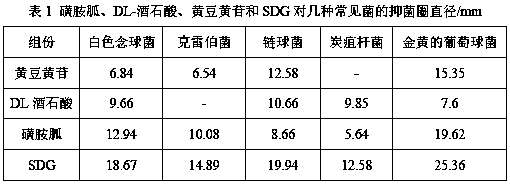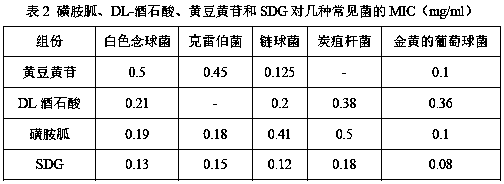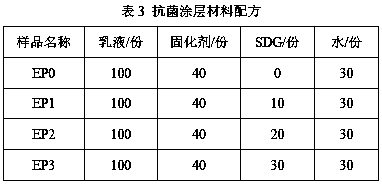Bio-based antibacterial coating and preparation method thereof
An antibacterial coating and bio-based technology, applied in the field of coatings, can solve problems such as poor heat resistance and coating failure, and achieve the effects of overcoming poor heat resistance, improving binding force, and wide source of materials
- Summary
- Abstract
- Description
- Claims
- Application Information
AI Technical Summary
Problems solved by technology
Method used
Image
Examples
Embodiment 1
[0023] (1) Synthesis of "triple antibacterial effect" antibacterial macromolecules.
[0024] Take 120ml DMSO as the reaction solution and place it in a 250ml three-necked flask. With the stirrer turned on (rotating speed 180r / min), add 9g of DL-tartar, add 2g of p-benzenesulfonic acid as a catalyst, and cool down to 0°C in an ice water bath. Then add 6 g of sulfaguanidine, react for 3 hours at room temperature, then filter, wash with deionized water three times, and dry the product in a vacuum drying oven to obtain a white powder sample.
[0025] ② Take 100ml N,N-dimethylformamide (DMF) as the reaction solution and place it in a 250ml three-necked flask. With the stirrer turned on (rotating speed 150r / min), add 5g of the white powder sample and thionyl chloride 1.2g, heated to 110°C, then added 6g of glycitein, stirred for 4h, took out the reaction solution, washed with methanol and deionized water for 3-4 times, and dried in a vacuum drying oven to obtain the "triple antibacteria...
Embodiment 2
[0029] (1) Synthesis of "triple antibacterial effect" antibacterial macromolecules.
[0030] Take 120ml DMSO as the reaction solution and place it in a 250ml three-necked flask. With the stirrer turned on (rotating speed 180r / min), add 9g of DL-tartar, add 2g of p-benzenesulfonic acid as a catalyst, and cool down to 0°C in an ice water bath. Then add 6 g of sulfaguanidine, react for 3 hours at room temperature, then filter, wash with deionized water three times, and dry the product in a vacuum drying oven to obtain a white powder sample.
[0031] ② Take 100ml N,N-dimethylformamide (DMF) as the reaction solution and place it in a 250ml three-necked flask. With the stirrer turned on (rotating speed 150r / min), add 5g of the white powder sample and thionyl chloride 1.2g, heated to 110°C, then added 6g of glycitein, stirred for 4h, took out the reaction solution, washed with methanol and deionized water for 3-4 times, and dried in a vacuum drying oven to obtain the "triple antibacteria...
Embodiment 3
[0035] (1) Synthesis of "triple antibacterial effect" antibacterial macromolecules.
[0036] Take 120ml DMSO as the reaction solution and place it in a 250ml three-necked flask. With the stirrer turned on (rotating speed 180r / min), add 9g of DL-tartar, add 2g of p-benzenesulfonic acid as a catalyst, and cool down to 0°C in an ice water bath. Then add 6 g of sulfaguanidine, react for 3 hours at room temperature, then filter, wash with deionized water three times, and dry the product in a vacuum drying oven to obtain a white powder sample.
[0037] ② Take 100ml N,N-dimethylformamide (DMF) as the reaction solution and place it in a 250ml three-necked flask. With the stirrer turned on (rotating speed 150r / min), add 5g of the white powder sample and thionyl chloride 1.2g, heated to 110°C, then added 6g of glycitein, stirred for 4h, took out the reaction solution, washed with methanol and deionized water for 3-4 times, and dried in a vacuum drying oven to obtain the "triple antibacteria...
PUM
 Login to View More
Login to View More Abstract
Description
Claims
Application Information
 Login to View More
Login to View More - R&D
- Intellectual Property
- Life Sciences
- Materials
- Tech Scout
- Unparalleled Data Quality
- Higher Quality Content
- 60% Fewer Hallucinations
Browse by: Latest US Patents, China's latest patents, Technical Efficacy Thesaurus, Application Domain, Technology Topic, Popular Technical Reports.
© 2025 PatSnap. All rights reserved.Legal|Privacy policy|Modern Slavery Act Transparency Statement|Sitemap|About US| Contact US: help@patsnap.com



